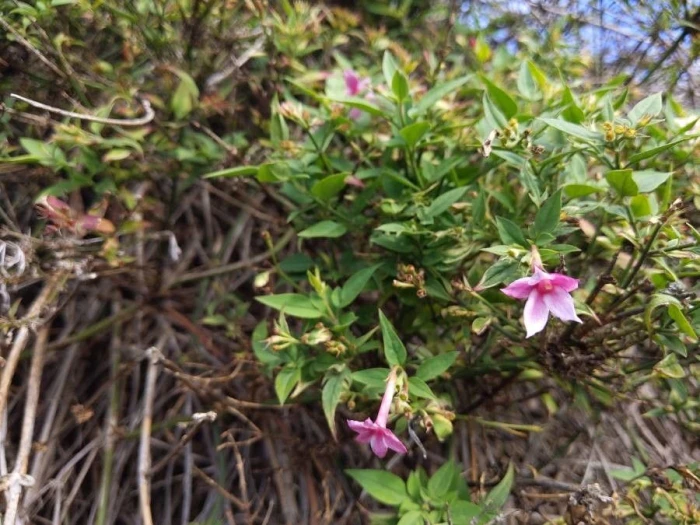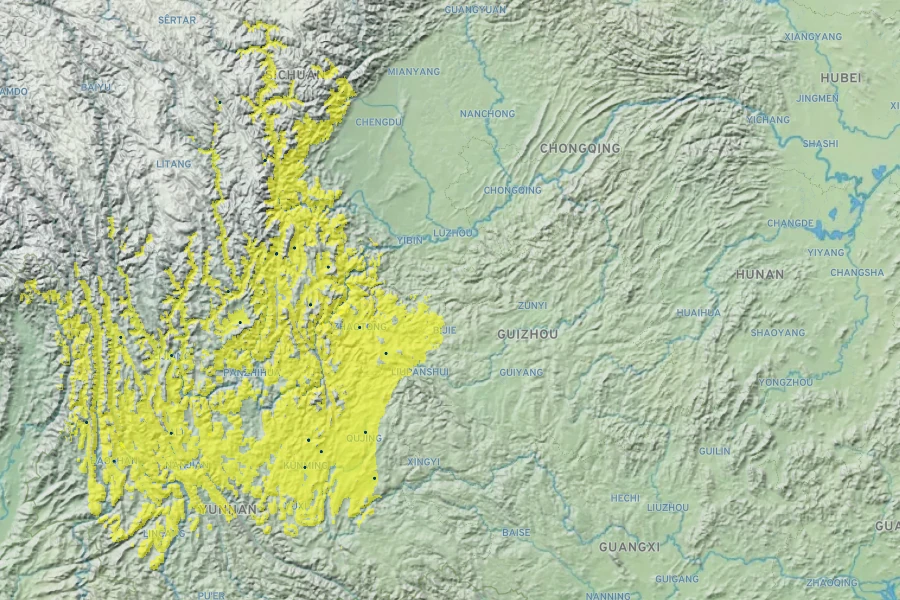Red Jasmine
/
(Jasminum beesianum)
Red Jasmine (Jasminum beesianum)
/

Harry Harry Stone
CC BY-SA 4.0
Image By:
Harry Harry Stone
Recorded By:
Copyright:
CC BY-SA 4.0
Copyright Notice:
Photo by: Harry Harry Stone | License Type: CC BY-SA 4.0 | License URL: https://creativecommons.org/licenses/by-sa/4.0/ | Attribution: Harry Harry Stone (cc-by-sa) | Rights Holder: Harry Harry Stone | Publisher: PlantNet | Date Created: 2020-10-05T11:05:56Z | Title: Jasminum beesianum Forrest & Diels: flower | Notes: |







Summary
Jasminum beesianum, commonly known as Red Jasmine, is a semi-deciduous perennial vine native to the mountainous regions of South-Central China and Tibet, where it thrives in forest margins and scrub areas. It can grow to a height of 10-15 feet (3-4.6 meters) and a width of 6-9 feet (1.8-2.7 meters). This vine is characterized by its slender stems and dark green leaves, which may drop some foliage in cooler climates or during periods of drought. Red Jasmine is notable for its tubular flowers that bloom in late spring to early summer, displaying a progression of colors from yellow to pink and finally to red as they mature, with a modest fragrance that is less intense than that of other jasmine species.
Red Jasmine is valued for its attractive, bicolored flowers and its ability to cover trellises, walls, and fences, providing vertical interest in the garden. It is often used for ornamental purposes in mixed borders or as a focal point when trained on an archway or pergola. While it can tolerate a range of light conditions from full sun to part shade, it prefers well-drained soils, making it relatively low maintenance. However, it may need support to climb effectively and can benefit from pruning to maintain its shape and promote vigorous growth.CC BY-SA 4.0
Red Jasmine is valued for its attractive, bicolored flowers and its ability to cover trellises, walls, and fences, providing vertical interest in the garden. It is often used for ornamental purposes in mixed borders or as a focal point when trained on an archway or pergola. While it can tolerate a range of light conditions from full sun to part shade, it prefers well-drained soils, making it relatively low maintenance. However, it may need support to climb effectively and can benefit from pruning to maintain its shape and promote vigorous growth.CC BY-SA 4.0
Plant Description
- Plant Type: Vine
- Height: 10-15 feet
- Width: 6-9 feet
- Growth Rate: Moderate
- Flower Color: Red
- Flowering Season: Spring, Summer
- Leaf Retention: Semi-deciduous
Growth Requirements
- Sun: Full Sun, Part Shade
- Drainage: Medium, Fast
Common Uses
Bee Garden, Bird Garden, Butterfly Garden, Deer Resistant, Drought Tolerant, Fragrant, Hummingbird Garden
Natural Habitat
Mountainous regions of South-Central China and Tibet, in forest margins and scrub areas
Other Names
Common Names: Beesianum Jasmine, Jasmin Rose, Rosenjasmin, Hong Su Xin, Jasmim
Scientific Names: Jasminum beesianum, Jasminum beesianum var. ulotrichum, Jasminum violascens, Jasminum delavayi, Jasminum delavayi publ, Jasminum valbrayi, Jasminum wardii
GBIF Accepted Name: Jasminum beesianum Forrest & Diels
